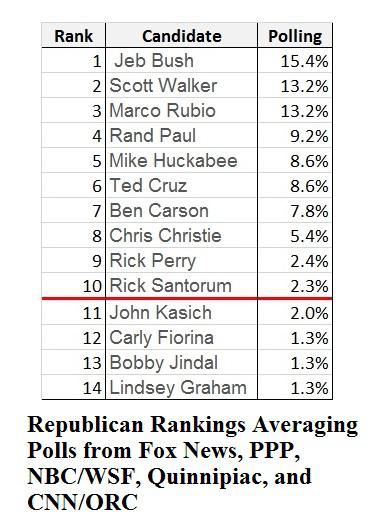Rick Santorum is Right: Fox News Needs to Change Its Debate Rules

Former senator Rick Santorum is upset about Fox’s top-ten polling criterion to debate. And he’s right. It is bad. Although, perhaps his alternative criterion of letting previous senators in automatically isn’t the best either. Nice try, Santorum.
What’s bad about this top-ten polling criterion?
First, the polls ask the wrong question. Respondents shouldn’t be hearing, “If the election were held today, which candidate would you vote for?” That makes no sense. The debates are for learning about candidates, not voting for them.
Second, the polls require respondents to choose only one option—essentially plurality voting. This is the voting method infamous for dividing support between remotely similar candidates, particularly in primaries. It’s also the least expressive voting method there is, widely considered the worst voting method—period—among academics. So there’s that.
What criterion should the debates use instead?
Let’s start by getting the question right. We want to know whom people want to see in the debates. So we should ask them: “Would you like to see this candidate in the debates?” That’s much more direct.
Now, take away the arbitrary limitation of choosing one candidate. Instead, let respondents answer “Yes,” “No,” or “No Opinion” for each of the candidates. Any candidate whom people say yes to more than no, let that candidate be in the debate.
This will limit your pool of debaters to only a handful, but you’ll get the type of in-depth discussion among just the serious contenders. This isn’t to say that everyone else is excluded. For instance, CNN is planning a second debate that includes every candidate that polled above 1% (using terrible plurality polling). Using a Yes/No-style polling, you could have a second tier debate where the cutoff is 25%.
With this direct ask approach, you’d limit the number of debaters, but you wouldn’t limit them arbitrarily. Candidates like Jeb Bush, Scott Walker, and Marco Rubio would still likely get in. A handful of others probably would as well, although it’s hard to predict using existing polling.
If you were thinking of whether this could apply to the general election as well, it absolutely could. Although, as discussed in a previous article, the Commission on Presidential Debates isn’t interested in inclusion outside the two major parties.
Editor's note: This article originally published on The Center for Election Science's blog on June 8, 2015.




